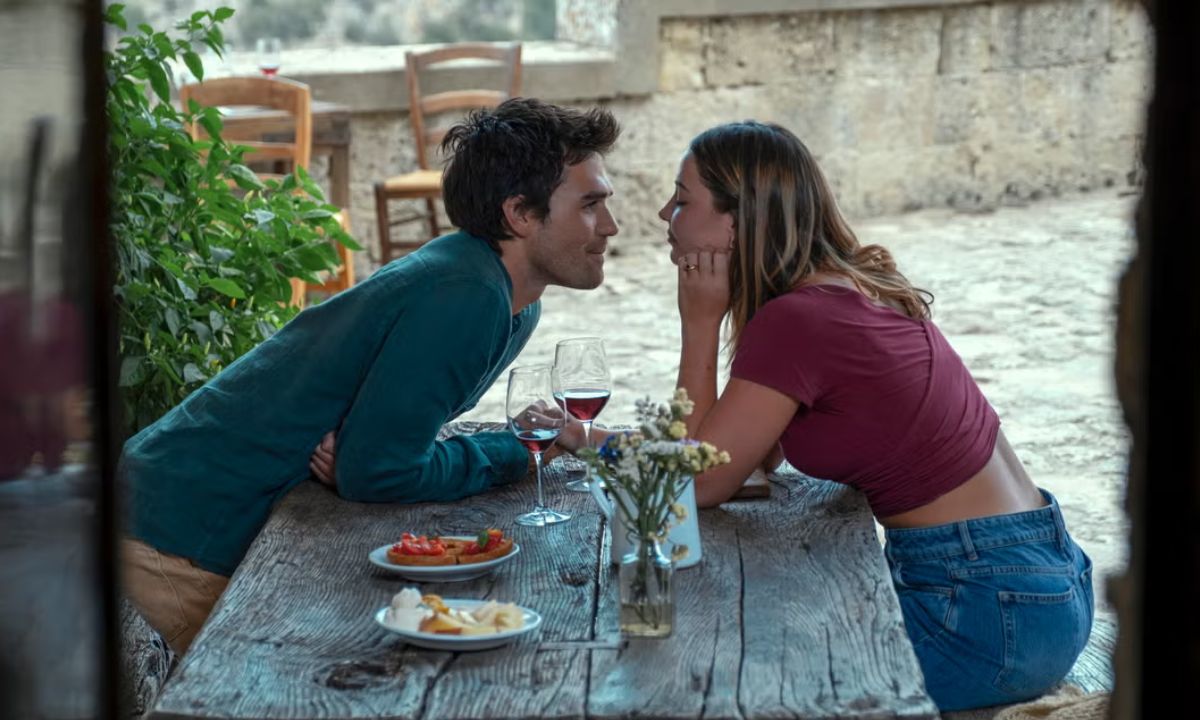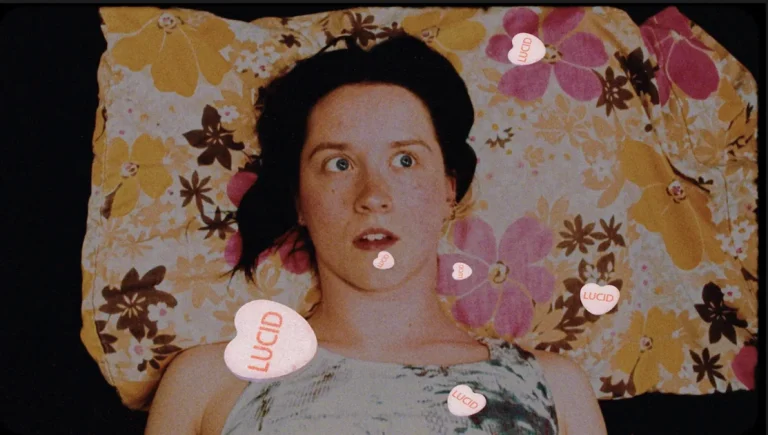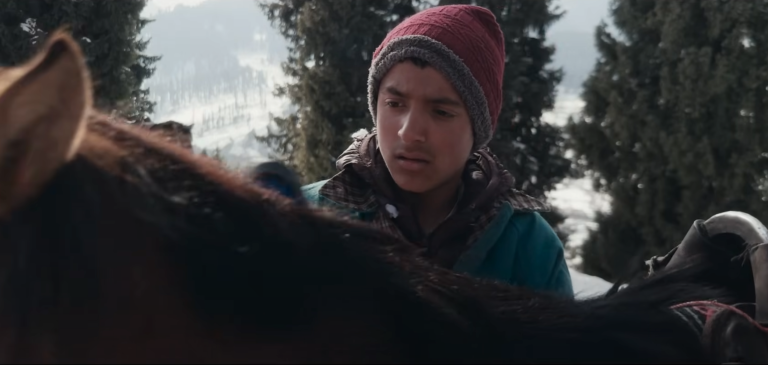The Map That Leads to You (2025), directed by Lasse Hallström, unfolds as a sweeping love story about travel, fleeting encounters, and the way passion can reorient one’s entire sense of purpose. At first, it carries the familiar air of an “abroad for the summer” tale—a young woman escaping her meticulously ordered life and falling for a captivating stranger. Yet beneath the postcard-perfect European backdrops lies something more profound: a meditation on mortality, the fragile freedom of living, and the decisions we face when time itself feels uncertain.
Adapted from J. P. Monninger’s novel, the film doesn’t dwell on permanence or the promise of togetherness. Instead, it lingers on the immediacy of love, on the fullness of presence. It asks: Can a fleeting, luminous moment hold more weight than the steadiness of a lifetime? By the end, Hallström offers a bittersweet yet hopeful answer—that what matters most is the courage to choose love and embrace life, even when tomorrow is never guaranteed.
The Map That Leads to You (2025) Plot Summary & Movie Synopsis:
What Brings Heather and Jack Together?
Heather is a disciplined New Yorker whose life revolves around her demanding banking job. She joins her friends Connie and Amy on a European trip before diving back into her corporate routine. Each friend carries their own agenda: Amy wants distraction from heartbreak, Connie wants indulgence, but Heather wants order, checking landmarks off her list with precision. On a train to Barcelona, Heather meets Jack, a free-spirited traveler from New Zealand carrying his great-grandfather Russell’s WWII-era travel journal.
Jack is recovering from cancer and determined to live without plans or constraints, honoring Russell’s wanderlust. Their first conversation, sparked by Hemingway’s The Sun Also Rises, plants the seed for what follows. Unlike Heather, Jack embraces chaos. Where Heather seeks control, Jack seeks freedom. Their opposing philosophies create friction, but also attraction. As their friends splinter off into their own adventures, Heather and Jack’s connection deepens, forcing Heather to step outside her rigid self and question what it means to live fully.
Why Does Jack Encourage Heather to Break Her Routine?
Jack takes Heather through Russell’s old travel routes, from Barcelona’s nightlife to cable cars and Spanish festivals. These moments are more than romantic escapades; they are lessons. Jack, having faced death, values memory over plans, presence over productivity. Heather resists at first, scolding Jack’s disdain for phones while pointing out his hypocrisy in reliving Russell’s past through the journal.
But Jack’s openness softens her guardedness. Slowly, Heather begins to taste a freer life: extending her trip, joining Jack in planting trees, and even falling for him against her cautious instincts. Jack’s purpose is twofold: to honor Russell and to teach Heather what he has learned through his brush with mortality, that love and freedom are worth more than rigid order. But Jack also hides something from Heather: his cancer has returned, and his carefree exterior is partly a shield against despair.
Why Does Jack Disappear at the Airport?
By the time Heather must return to New York, Jack promises to accompany her. He even books a ticket, signaling commitment. But at the airport, he vanishes, leaving Heather shattered. This isn’t abandonment for selfish reasons; it’s self-protection. Jack knows his illness is worsening, and he cannot bear to tether Heather to a future defined by hospitals, treatments, and loss. His ghosting is both an act of cowardice and sacrifice: he chooses to hurt her once, decisively, rather than force her into long-term suffering. For Heather, the sudden rupture is devastating. For Jack, it is the only way to preserve the memory of their love without letting it be consumed by his decline.
How Does Heather’s Father Influence Her Choices?
Back in New York, Heather struggles with emptiness. Her father, a self-made man who raised her alone, notices her disillusionment. In a pivotal moment, he tells her that the only way she can disappoint him is by betraying herself. This conversation reframes Heather’s inner conflict. Her father, once the symbol of discipline and responsibility, validates the very freedom Jack had been pushing her toward. Heather realizes that her feelings for Jack are not a detour but a necessary awakening.
Why Does Jack Leave a Letter for Heather?

Months later, Heather returns to Barcelona for Connie and Raef’s wedding. Still haunted by Jack’s absence, she learns from Raef that Jack left her a letter. In it, Jack confesses the truth: his cancer has returned, and his nomadic life was as much about fleeing inevitability as it was about embracing adventure. Yet he insists their love gave him strength, and that Russell’s journal, his ‘map’, ultimately led him not just across Europe, but to Heather. The letter functions as both closure and invitation. It acknowledges Jack’s fear but also leaves Heather with a clue, almost daring her to find him if she truly believes their love is worth the risk.
The Map That Leads To You (2025) Movie Ending Explained:
Does Heather Reunite with Jack at the End?
Following the letter’s hints and recalling Russell’s note about the Santa Pau harvest festival, where villagers dance in the face of death, Heather travels there. In a poetic convergence, the festival is underway, brimming with life and renewal. Heather finds Jack among the celebrants. Overjoyed yet hesitant, Jack questions whether she should bind herself to someone with no future.
But Heather, transformed by both Jack and her father’s wisdom, chooses him anyway. For her, love isn’t about years counted but moments shared. The final embrace echoes Jack’s earlier lesson: living fully is not about escaping death but defying it through connection. Heather becomes Jack’s ‘Mary Welsh,’ the partner who stays until the end, no matter how brief the time may be.
Don’t Miss This: Why Punch-Drunk Love (2002) is the Greatest Romcom of All Time?
The ending of “The Map That Leads to You” is deliberately bittersweet. It rejects the fantasy of eternal love and instead honors the fragility of time. Heather’s choice to be with Jack, even knowing his illness, signals her liberation from a life dictated by duty. Jack, meanwhile, finally allows himself to be loved without hiding behind detachment. The harvest festival imagery underscores the film’s central idea: love is an act of defiance against death. Russell’s journal, Hemingway’s reflections, and Jack’s travels all converge in this truth. The ‘map’ doesn’t lead to a destination; it leads to courage, the courage to love, even when loss is inevitable.
Why Does Heather Stay in Europe?
Heather had been looking forward to returning to New York right after her trip. Returning to her banking job, with her salary and money and her structured lifestyle. However, the time she spent with Jack changed everything. She began to realize that her meticulously planned and well-thought-out plans had left her little room for happiness, spontaneity, or love. Her decision to stay a little longer is not a coincidence.
It is the result of everything that Jack has been teaching her. The excitement of going out in Barcelona at night, the joy of strangers at festivals, and the heaviness of Russell’s journal all lead Heather to the conclusion that living cannot be a checklist. When Jack begs her to stay, she realizes that going back to New York would mean that she would immediately deny herself the chance to experience a different, freer life than she had planned for herself.
On a deeper level, Heather stays because she finally recognizes what her father always preached: responsibility matters, but it shouldn’t come at the cost of self-betrayal. For once, she chooses herself, not her job, not her obligations, not other people’s expectations. Europe becomes more than a vacation; it becomes the space where Heather learns that purpose is not found in rigid plans, but in experiences that move the heart.
Lasse Hallstrom’s film may seem old-fashioned in a world of fleeting swipes and uncertain commitments, but that is precisely its power. “The Map That Leads to You” reminds us that impermanence doesn’t weaken love; it sharpens it. Heather and Jack’s story is not about forever. It’s about choosing each other in the now, dancing, as Russell wrote, ‘in the face of death.’





![Gabbeh [1996] Analysis: Glimpses into a lyrical divinity](https://79468c92.delivery.rocketcdn.me/wp-content/uploads/2022/08/Gabbeh-1996-768x509.jpg)
